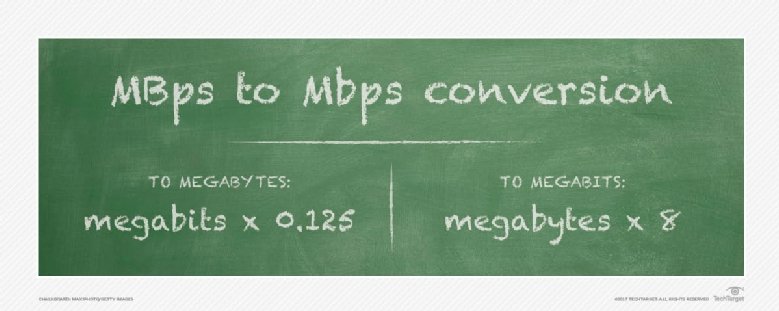Mbps (megabits per second)
Megabits per second (Mbps) are a unit of measurement for bandwidth and throughput on a network. Each megabit is equal to 1 million bits.
Mbps belongs to a family of metrics used to measure the capacity and speed of data transfer. The capacity smaller than Mbps is kilobits per second (Kbps), with the prefix kilo representing 1,000 bits per second, and higher than Mbps are gigabits per second (Gbps), with the prefix giga indicating 1 billion bits per second. Using these metrics, 1,000 Mbps is equal to 1 Gbps.
A megabit is one million binary pulses, or 1,000,000 (that is, 106) pulses (bits). For example, a U.S. phone company T-carrier system line is said to sustain a data rate of 1.544 megabits per second, which meant a T line can transfer up to 1.544 Mbps.
Mbps vs. MBps: What’s the difference?
Although they share the same letters, the abbreviations Mbps and MBps have different meanings. MBps stands for megabytes per second, with the bytes suffix referring to a unit of measurement for file size. In contrast, Mbps represents the bit capacity of a network connection.
A bit is not the same size as a byte, so Mbps and MBps are not interchangeable. Each byte contains eight bits. The following formulas can be used to convert each metric:

Calculating download times
It should be noted that adding more Mbps of bandwidth does not guarantee faster network transmissions, which include upload speed and download speed. Bandwidth is a measurement of network capacity — that is, the maximum volume of data that can be transferred in one second. Factors like congestion and latency can reduce a connection speed or cause it to fluctuate. Internet service providers and network equipment vendors often advertise “up to” a certain number of Mbps, indicating a theoretical maximum that is unlikely to be achieved at all times outside of a laboratory.
- Convert the megabytes in the file size (100 MB) to megabits: 100 × 8 = 800 megabits
- Divide that sum by the connection speed (100 Mbps): 800 ÷ 100 = 8 seconds
How are Mbps network connections categorized?
Among internet service providers, the most common sizes of Mbps speeds offered are:
- 8 Mbps
- 16 Mbps
- 32 Mbps
- 50 Mbps
- 100 Mbps
Among network equipment vendors, devices like switches are often advertised as “10/100 Mbps,” which means its ports can support 10 and 100 Mbps Ethernet connections.